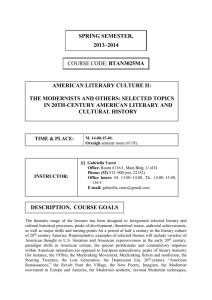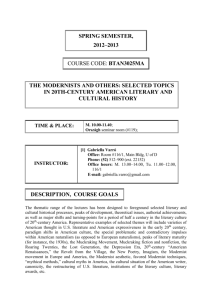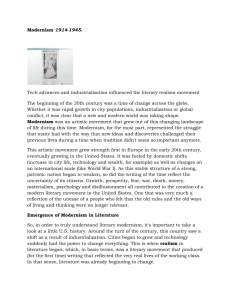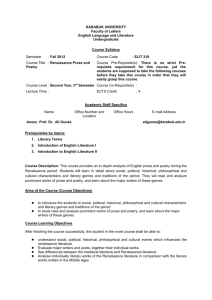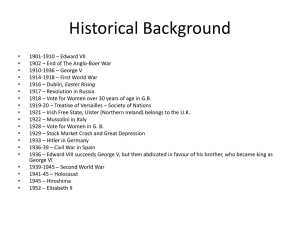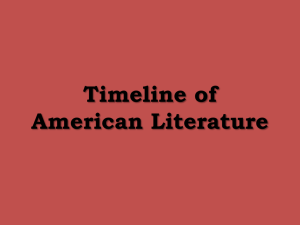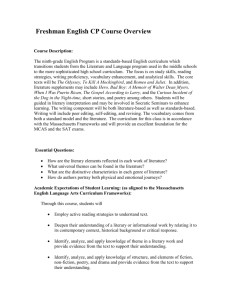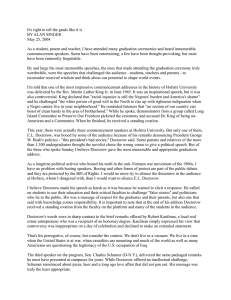University of Kent at Canterbury
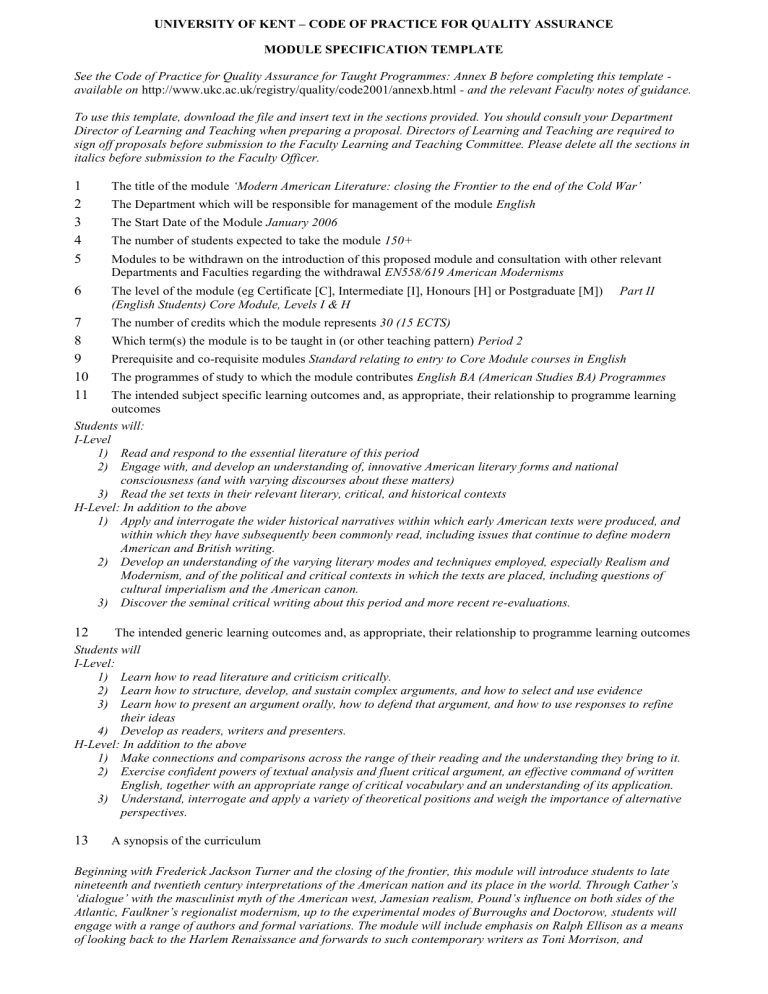
UNIVERSITY OF KENT – CODE OF PRACTICE FOR QUALITY ASSURANCE
MODULE SPECIFICATION TEMPLATE
See the Code of Practice for Quality Assurance for Taught Programmes: Annex B before completing this template - available on http://www.ukc.ac.uk/registry/quality/code2001/annexb.html - and the relevant Faculty notes of guidance.
To use this template, download the file and insert text in the sections provided. You should consult your Department
Director of Learning and Teaching when preparing a proposal. Directors of Learning and Teaching are required to sign off proposals before submission to the Faculty Learning and Teaching Committee. Please delete all the sections in italics before submission to the Faculty Officer.
1 The title of the module ‘Modern American Literature: closing the Frontier to the end of the Cold War’
2 The Department which will be responsible for management of the module English
3 The Start Date of the Module January 2006
4 The number of students expected to take the module 150+
5 Modules to be withdrawn on the introduction of this proposed module and consultation with other relevant
Departments and Faculties regarding the withdrawal EN558/619 American Modernisms
6 The level of the module (eg Certificate [C], Intermediate [I], Honours [H] or Postgraduate [M]) Part II
(English Students) Core Module, Levels I & H
7 The number of credits which the module represents 30 (15 ECTS)
8 Which term(s) the module is to be taught in (or other teaching pattern) Period 2
9 Prerequisite and co-requisite modules Standard relating to entry to Core Module courses in English
10 The programmes of study to which the module contributes English BA (American Studies BA) Programmes
11 The intended subject specific learning outcomes and, as appropriate, their relationship to programme learning outcomes
Students will:
I-Level
1) Read and respond to the essential literature of this period
2) Engage with, and develop an understanding of, innovative American literary forms and national consciousness (and with varying discourses about these matters)
3) Read the set texts in their relevant literary, critical, and historical contexts
H-Level: In addition to the above
1) Apply and interrogate the wider historical narratives within which early American texts were produced, and within which they have subsequently been commonly read, including issues that continue to define modern
American and British writing.
2) Develop an understanding of the varying literary modes and techniques employed, especially Realism and
Modernism, and of the political and critical contexts in which the texts are placed, including questions of cultural imperialism and the American canon.
3) Discover the seminal critical writing about this period and more recent re-evaluations.
12 The intended generic learning outcomes and, as appropriate, their relationship to programme learning outcomes
Students will
I-Level:
1) Learn how to read literature and criticism critically.
2) Learn how to structure, develop, and sustain complex arguments, and how to select and use evidence
3) Learn how to present an argument orally, how to defend that argument, and how to use responses to refine their ideas
4) Develop as readers, writers and presenters.
H-Level: In addition to the above
1) Make connections and comparisons across the range of their reading and the understanding they bring to it.
2) Exercise confident powers of textual analysis and fluent critical argument, an effective command of written
English, together with an appropriate range of critical vocabulary and an understanding of its application.
3) Understand, interrogate and apply a variety of theoretical positions and weigh the importance of alternative perspectives.
13 A synopsis of the curriculum
Beginning with Frederick Jackson Turner and the closing of the frontier, this module will introduce students to late nineteenth and twentieth century interpretations of the American nation and its place in the world. Through Cather’s
‘dialogue’ with the masculinist myth of the American west, Jamesian realism, Pound’s influence on both sides of the
Atlantic, Faulkner’s regionalist modernism, up to the experimental modes of Burroughs and Doctorow, students will engage with a range of authors and formal variations. The module will include emphasis on Ralph Ellison as a means of looking back to the Harlem Renaissance and forwards to such contemporary writers as Toni Morrison, and
UNIVERSITY OF KENT – CODE OF PRACTICE FOR QUALITY ASSURANCE
Adrienne Rich as an entry point to a consideration of the political, historical, and theoretical contexts of twentieth century women’s poetry in the USA.
The module’s narrative will hinge on two lectures: the lecture on Turner and the closing of the frontier, and the lecture on the definition of the American canon. The first of these (week 1) will be followed by a series of responses to the fact of the closing of the frontier: the turn to Europe presented by James and Pound, William Carlos Williams’ search for a local aesthetic and Faulkner’s insistence on the importance of region. The lecture on the definition of the American canon (week 7) will focus on a key critical text—for instance Olson’s Call me Ishmael—and will consider the political and cultural motivations behind the formation of the American Renaissance. It will also look forward to the political uses to which American culture was put during the early years of the cold war. Students will be expected to engage with such ideas as literary nationalism and cultural imperialism, and will be encouraged both to question the canon ( its construction and diffusion in the late twentieth century), and to explore alternatives, for which Ellison’s Invisible
Man and Adrienne Rich’s poetry will provide exemplary starting points.
The module will give close attention to American literary modes, through realism, modernism, and beyond, considering the importance of both the city and the regions as sites of literary consciousness, and the impact of continuing transatlantic exchange on the development of American writing. The key theme of canon formation running throughout, the module will encourage students to reflect back on ‘Early American Literature’ and the questions it raises.
A sample programme, for indicative purposes:
Wk1 – Frederick Jackson Turner and the Catherian response
Wk2 – Henry James, Portrait of a Lady
Wk3 – Selected poetry of Ezra Pound
Wk4 – Selected poetry of William Carlos Williams
Wk5 – William Faulkner, Light in August
Wk7 – Defining the American Canon: Cultural Imperialism and the American Renaissance
Wk8 – Ralph Ellison, Invisible Man (with reference to other African American writers)
Wk9 – William Burroughs, Naked Lunch
Wk10 – Selected poetry of Adrienne Rich (and the ‘women’s canon’)
Wk11 – EL Doctorow, The Book of Daniel
14 Indicative Reading List
*texts to buy
*Turner, FJ The Frontier In American History (e-text available) (1920)
*Cather, Willa O Pioneers!
(1913)
*James, Henry The Portrait of a Lady (1881)
*Faulkner, William, Light in August (1932)
*Ellison, Ralph Invisible Man (1952)
*Burroughs, William Naked Lunch (1959)
*Doctorow, EL The Book of Daniel (1971)
Select Bibliography:
Baker, Houston A, Modernism and the Harlem renaissance (1987)
Fowler, Douglas, Understanding E. L. Doctorow (1992)
Gelpi, Albert J, A coherent splendor : the American poetic renaissance, 1910- 1950 (1990)
Godden, Richard, Fictions of capital : the American novel from James to Mailer (1990)
Gray, Richard J, American poetry of the twentieth century (1990)
Levenson, Michael H, The Cambridge companion to modernism (1999)
Lydenberg, Robin Word cultures: radical theory and practice in William S. Burroughs' fiction (1987)
Michaels, Walter Benn, Our America: nativism, modernism, and pluralism (1995)
Murphy, Timothy S. Wising up the marks: the amodern William Burroughs (1997)
Pippin, Robert B. Henry James and Modern Moral Life (2001)
Stanford, Donald E., Revolution and convention in modern poetry : studies in Ezra Pound, T.S. Eliot, Wallace Stevens,
Edwin Arlington Robinson, and Yvor Winters (1983)
Williams, John, Fiction as false document : the reception of E.L. Doctorow in the postmodern age (1996)
UNIVERSITY OF KENT – CODE OF PRACTICE FOR QUALITY ASSURANCE
15 Learning and Teaching Methods, including the nature and number of contact hours and the total study hours which will be expected of students, and how these relate to achievement of the intended learning outcomes
The module would be taught through 2 hour seminars and 1 hour lectures. Total study hours, 20 hours per week including teaching contact, throughout the period in which it is taught. Seminar discussion will enable students to develop those skills indicated in 11.I. 1-3 & H.1-3 and 12.I.1-3 and H.1-3.
16 Assessment methods and how these relate to testing achievement of the intended learning outcomes
Assessment will be by means of 2 essays (totalling 6-8.000 words) and a separate exam at I and H level. These assessment methods relate to the intended learning outcomes by enabling student-centred exploration and discussion of the material, and encouraging independent research and organisation. These modes of assessment relate specifically to learning outcomes 11.I.1-3 and H.1&2, and 12.I.1, 2&4 and H.1-3.
17 Implications for learning resources, including staff, library, IT and space Standard seminar rooms with audiovisual facilities.
18 A statement confirming that, as far as can be reasonably anticipated, the curriculum, learning and teaching methods and forms of assessment do not present any non-justifiable disadvantage to students with disabilities
No aspect of the module will present insurmountable obstacles to students with disabilities. Students with visual or hearing impairments will be presented with appropriate alternative materials as and when necessary.
Statement by the Director of Learning and Teaching: "I confirm I have been consulted on the above module proposal and have given advice on the correct procedures and required content of module proposals"
................................................................
Director of Learning and Teaching
..............................................
Date
Statement by the Head of Department: "I confirm that the Department has approved the introduction of the module and will be responsible for its resourcing"
.................................................................
Head of Department
Revised August 2002; Revision 2 in 2003.
..............................................
Date
